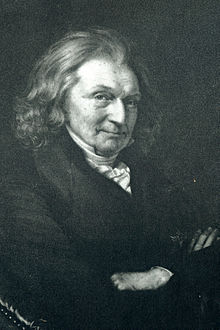Christoph of Sethe
Christoph Wilhelm Heinrich Sethe (born April 25, 1767 in Kleve , † April 30, 1855 in Berlin ) was a German lawyer.
Life
Sethe was the eldest son of eight children of the royal Prussian court counselor Caspar Henrich Sethe (1732-1806) and his wife Christine Marie Grolman (1733-1819) in the Prussian Duchy of Kleve into a Rhineland legal family. One of his siblings was the lawyer Christian Diedrich Heinrich Sethe (1778–1864). He spent his childhood in Kleve , where he attended the Kleve Latin School in 1774 . At the age of sixteen he began studying law at the University of Duisburg , where he enrolled on October 15, 1783. From April 30, 1785 he studied at the Friedrichs University in Halle an der Saale and later also at the Georg August University in Göttingen. In 1789 he joined the Corps Guestphalia Halle in Halle . He completed his legal clerkship in 1790 with an exam in Berlin . In 1791 his legal career began as an assessor in the Klevian government. He married Henriette Philippine Helene Sack in 1796.
During the French era , which brought about the introduction of French law in the French-occupied or influenced areas on the Rhine , he successfully continued his career. In 1812 he became General Procurator at the Düsseldorf Court of Appeal and Council of State in the Grand Duchy of Berg . After the uprising of the stick Russians in 1813, Sethe rejected the persecution of those responsible that Napoleon demanded. He was therefore summoned to Paris and received by Napoléon Bonaparte as “Advocat du Rhin” .
Under the Prussian government, Sethe was appointed court counselor, real privy councilor and, in 1819, chief president of the Rhenish Auditing and Cassation Court. He headed the Rheinische Immediat-Justiz-Kommission, which was supposed to compare Prussian and French law in 1816 with regard to territorial legislation for the Rhineland . He successfully defended the principles of freedom that the French Civil Code in particular had brought to the right bank of the Rhine.
With the award of the Black Eagle Order in 1850, the elevation to the nobility ( ennoblement ) went hand in hand. Sethe rejected this out of his bourgeois self-image. Due to the fixed connection between the award and the elevation, he was officially assigned to the nobility.
Works
- Documentary evolution of the nature of the body profit cargoes and refutation of the Honorable Councilor Mallinckrodt about it ... put forward false allegations . Düsseldorf 1810. ( digitized version )
- World history on the Rhine experienced 1770–1815. Memories of the Rhinelander Christoph Wilhelm Heinrich Sethe from the time of the European upheaval , Ed. Adolf Klein. Wienand, Cologne 1973. Without ISBN
- Mémoire sur le droit de chasse par rapport au Code Napoléon , undated
literature
- Hermann Hüffer : Sethe, Christoph . In: Allgemeine Deutsche Biographie (ADB). Volume 34, Duncker & Humblot, Leipzig 1892, pp. 45-48.
- Wilhelm Weisweiler: History of the Rhenish Prussian notary's office . Volume 2: The Prussian Period . Baedeker, Essen 1925, (also reprint: Scientia-Verlag, Aalen 1998, ISBN 3-511-06250-0 ), pp. 170-173.
- Gudrun Seynsche: The Rhenish Auditing and Cassation Court in Berlin (1819-1852). A Rhenish dish on foreign soil. Duncker & Humblot, Berlin 2003, ISBN 3-428-10886-8 , ( Writings on European legal and constitutional history 43), (At the same time: Trier, Univ., Diss., 2001–2002).
Web links
- Literature by and about Christoph von Sethe in the catalog of the German National Library
- Historical sketches of the Brandenburg and Prussian legislation, regarding the oral trial before the assembled court, Journal for Scientific Processing of Prussian Law, Vol. 1, 1830, pp. 27 ff.
- About the compulsory obligation to correct the title of property in the land and mortgage book, Journal for Scientific Processing of Prussian Law, Vol. 1, 1830, pp. 358 ff.
- Sethes house
Individual evidence
- ↑ Kösener Corpslisten 1960, 116 , 234
- ↑ Set's records of political life in the Rhine area, which were considered lost for a long time
| personal data | |
|---|---|
| SURNAME | Sethe, Christoph von |
| ALTERNATIVE NAMES | Sethe, Christoph Wilhelm Heinrich (full name) |
| BRIEF DESCRIPTION | German lawyer |
| DATE OF BIRTH | April 25, 1767 |
| PLACE OF BIRTH | Kleve |
| DATE OF DEATH | April 30, 1855 |
| Place of death | Berlin |
